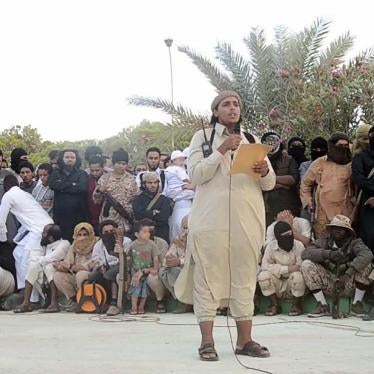The Iraqi government has hurled the country to the brink of a new civil war. In under a month, Baghdad launched a vicious assault on a Sunni protest camp, resulting in 44 deaths; executed 21 alleged Sunni terrorists in one day, and suspended the licenses of 10 satellite channels, 9 of them deemed pro-Sunni.
Prime Minister Nuri Kamal al-Maliki’s message to his country’s extremely disaffected Sunni minority, which resists with an increasing sense of futility joining the battles between Maliki’s forces and extremists? “Bring It On!”
The country remains in shambles after years of gruesome civil war pitting the minority Sunnis against the newly dominant Shias. Ten years after the U.S.-led invasion, most people still experience electricity and water shortages. Iraq’s education and health services, once Middle East jewels, are skeletons of their past. And unemployment and poverty have spiraled to record peace-time levels.
A promise of power-sharing helped wind the war down, but sheer exhaustion probably had more to do with the relative calm of recent years than any wise political leadership.
The government has failed to address any of the major grievances of the Sunni — and even some Shia — communities. Those include ongoing exclusion from the political process, with regular delays in elections; no real reforms in the punitive, wildly overbroad “De-Baathification” and antiterrorism laws; increasingly centralized power in the hands of the prime minister; and brutal policing, with mass arrests, unfair trials and endemic torture in Iraqi prisons. But since early 2012, Sunnis have challenged the status quo with persistent, overwhelmingly peaceful protests, despite violent incursions by the state authorities.
It is in this environment that Maliki’s SWAT security forces, along with army and federal police, carried out an armed attack on one of the longest-running protest camps, in the Sunni village of Hawija. A parliamentary committee’s preliminary findings were that 44 people were killed and 104 injured, with the government saying 3 police officers were killed. Remarkably, the attack came after several days of negotiations with the protesters, whom the government accused of harboring militants who had killed a soldier, and taking weapons from a nearby checkpoint.
The government has not made public any finding of weapons or killers. In an apparent acknowledgement that the attack had gone too far, Maliki announced the appointment of a ministerial committee, headed by the Sunni deputy prime minister, Saleh al-Mutlaq, to investigate. But the committee seems designed to placate the Sunni community with compensation for the victims, with no intent to identify what really happened or who ordered the attack, much less punish those responsible. The committee has no actual investigators or resources to gather evidence, relying only on the ministers themselves to conduct the inquiry.
When I asked Mutlaq whether they would interview the security forces about who ordered the attack, he shook his head, almost amused at the question. Hussain al-Shahristani, the Shia deputy prime minister who is also on the committee, told me in a meeting in Baghdad last week: “Don’t expect too much from us. We really don’t have much time for this.” The government’s efforts to brush the shocking incident under the rug will only enrage its aggrieved minority even more.
The mass Hawija killings may have been a bloodier message to Sunni protesters than even Maliki may have intended, but there was no room for accident in his decision to execute 21 alleged terrorists whose identities and crimes remain unknown to the public.
Following an outcry against revelations of abuse of women detainees and the arrest of several bodyguards of the popular Sunni finance minister, the government promised in January to reform the judicial system, including reviewing the cases of 6,000 people who have been detained but not tried or even ordered released, in some cases for years, under the country’s antiterrorism law, and initiating an inquiry into widespread allegations of forced confessions and reliance on secret informants.
High-level officials even promised a moratorium on the death penalty until they reviewed all death sentences. But the government apparently decided to flex its law-and-order muscle in the face of escalating terrorist attacks, most frequently in Shia neighborhoods, which killed 712 people in April, the deadliest month since 2008. It resumed executions, generating a new cycle of protests and condemnations.
Although its roads are in ruins and bombed-out buildings litter Baghdad’s streets, the government has found the resources to equip the Communication and Media Commission with state-of-the-art surveillance equipment. Mujahid Abu al-Hail, the director of its Audiovisual Media Regulation Department, proudly displayed the center where a sizable staff continuously monitors the programming of over 15 satellite stations in the country, and an office filled with binders of records on their compliance.
On April 29, the commission suspended the licenses of 10 stations because they promoted sectarian views that contributed to violence, he said, but so far he has failed to share a report documenting evidence of this. The inclusion of a small Shia station among the nine banned “pro-Sunni” stations, including Al Jazeera, did nothing to mask this blatant effort to silence Sunni news outlets that have been critical of the government. It follows numerous attacks on media covering the protests, and last year’s announcement that it would close 44 stations operating “illegally.”
There’s no doubt that Iraqi media are extremely partisan, and that Sunni and Shia stations often indulge in gross misinformation to stoke sectarian tensions. But a government concerned with tamping down these tensions might spend more time carrying out real efforts to address community grievances, not silencing the aggrieved voices themselves.
The predictable outcome of these moves has been further radicalization of the Sunni community, with newly established militias vowing to defend them. Maliki needs a new playbook — one with lessons on leadership and reform that will bring the country together on the basis of protecting every citizen’s freedom, not tear it further apart.
Sarah Leah Whitson is Middle East director at Human Rights Watch.







